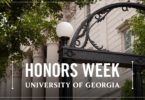Athens, Ga. – The University of Georgia School of Law will host the Georgia Court of Appeals on Oct. 14 in its Hatton Lovejoy Courtroom as the court hears oral arguments on three cases involving medical negligence, sovereign immunity and aggravated assault.
The proceedings will begin at 10:30 a.m. A question-and-answer session with Court of Appeals judges will follow the arguments. The event is free and open to the public.
The bench will be comprised of Presiding Judge Anne Elizabeth Barnes, Judge William M. Ray II and Judge Carla Wong McMillian. All three are graduates of Georgia Law. The last time the Court of Appeals held oral arguments at the law school was in 2007.
Georgia Law Dean Peter B. “Bo” Rutledge said having the court hear arguments at the law school benefits students greatly. “This unique opportunity to witness firsthand Court of Appeals proceedings will offer our students a front-and-center view into the legal system that will assist them as they move forward with their education and careers,” he said. “It is also a tremendous opportunity for the public at large to see the Georgia Court of Appeals in action.”
The following cases will be heard: R. Robles, individually and as surviving spouse and administrator of estate of Iselda Moreno v. P. Yugueros, M.D. and artisan plastic surgery (medical negligence); Raw Properties Inc. v. C. Lawson, tax commissioner and ex-officio sheriff of DeKalb County, and DeKalb County (sovereign immunity); and M. Williams v. State (aggravated assault).
In Robles, Rudy Robles is appealing a court decision that found a surgeon not responsible for the death of his wife after a tummy tuck surgery. The case argues that a surgeon failed to recognize that the patient had an acute abdominal process, which the appellant asserts led to her death.
In Raw, the real estate company is appealing a court decision that found a tax commissioner was entitled to sovereign immunity against damage claims stemming from a sale of RPI’s real property, which the company alleges was wrongfully sold for taxes after statutory procedures were not followed.
In Williams, the appellant is appealing a court decision that refused Williams a new trial after he was found guilty of aggravated assault. In the case, the victims of the assault initially identified Williams as a shooter but later recanted at trial. The state claims the recantations resulted from threats against the witnesses.
Written briefs of each case are available at http://libguides.law.uga.edu/GaCtofApp.
UGA School of Law
Consistently regarded as one of the nation’s top public law schools, Georgia Law was established in 1859. Its accomplished faculty includes authors of some of the country’s leading legal scholarship. The school offers three degrees-the Juris Doctor, the Master of Laws and the Master in the Study of Law-and is home to the Dean Rusk International Law Center. Georgia Law is proud of its long tradition of providing first-rate legal training for future leaders who will serve state and nation in both the public and private sectors. For more information, see www.law.uga.edu.
Note to editors: To attend the Georgia Court of Appeals session, please contact the law school’s communications office at lawcomm@uga.edu or 706-542-5172 so that seating is ensured.






